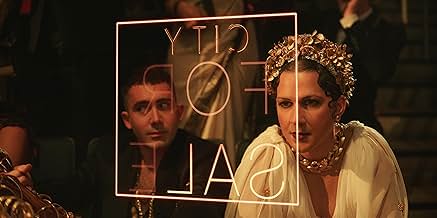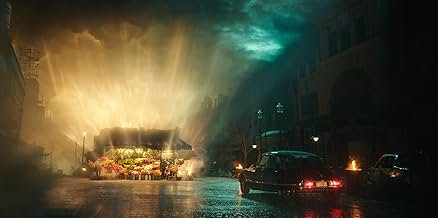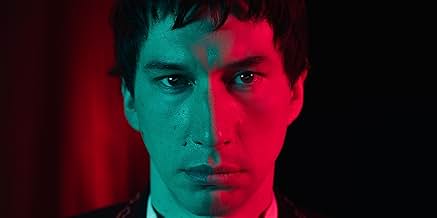Un arquitecto quiere reconstruir la ciudad de Nueva York como una utopía tras un desastre devastador.Un arquitecto quiere reconstruir la ciudad de Nueva York como una utopía tras un desastre devastador.Un arquitecto quiere reconstruir la ciudad de Nueva York como una utopía tras un desastre devastador.
- Dirección
- Guión
- Reparto principal
- Premios
- 3 premios y 18 nominaciones en total
- Huey Wilkes
- (as Bailey Ives)
Resumen
Reseñas destacadas
The film's plot revolves around the ideological clash between the prodigious architect Cesar Catalina, a Nobel laureate, and Frank Cicero, the mayor of New Rome-a futuristic New York City. While the politician governs with his eyes set on the past, relying on experience and tradition in his decisions, the architect dreams of radically transforming life through a utopia enabled by "megalon," a miraculous material. Throughout the film, Coppola denounces the rampant hypocrisy and corruption of contemporary Western society. The spectacle of life, the manipulation of information, the commercialization of sex-all these are symptoms of a morally bankrupt empire, led by a decadent elite lost in excess and vanity. The only way out for such a civilization appears to be the reform envisioned by Cesar. He believes he can resolve all social contradictions through his "megalon," raising a new world from the ruins of New Rome. To achieve this, he must overcome skeptics and survive the vicious.
Although *Megalopolis* was originally conceived over twenty years ago, the discussions Coppola raises are strikingly relevant, especially in his critique of mass media and mass politics. The film has a beating heart and can engage the viewer in its most intense moments. What it unfortunately lacks, however, is structure and substance. Coppola paints his film like a Pollock painting, yet without any sense of harmony or flow in his brushstrokes, and the result is a chaotic and disjointed work. *Megalopolis* is laden with intention and argument, but it lacks direction, lacks synthesis, and fails to turn its theme into poetry. The film blends grandiose imagery, bolstered by a thunderous score, with the ridiculous, as crude visual effects bring a cheap surrealism to life. The dialogues are eloquently robotic, and they only function because of the actors who manage (which is a testament to the quality of the cast) to convey some humanity to their characters. Coppola fails to present New Rome as a believable, palpable world, which limits the viewer's ability to become involved. At no point does the city appear as anything more than a metonymy for America, and its inhabitants are not particularly compelling.
The film is also packed with homages to classics that inspired the director, with one scene, for instance, evoking the epic *Ben-Hur*. Amid so many tributes, one stands out, perhaps to the detriment of the film itself. From its very title, *Megalopolis*, comparisons with Fritz Lang's legendary *Metropolis* become inevitable. Coppola's production, in some ways, is almost a modern reinterpretation of the German master's work, with some parallels between the two films. In both, the protagonist is a wealthy young man trying to address the terrible inequalities of a futuristic society. And in both, love is a positive force that drives change-the man who loves yearns to transform society. But while *Metropolis* is flawless in its presentation, *Megalopolis* fails to convince. It does not impress with its visuals, which are largely uninteresting; it does not deliver an engaging plot, nor memorable characters. It has the virtue of saying exactly what the filmmaker wanted to say-it is assertive and confident in its message without being, however, preachy. But a dozen well-thought-out metaphors do not make a good movie.
Coppola may have become a prisoner of his own myth. Many refuse to accept anything less than a masterpiece from him, and *Megalopolis*, unfortunately, is not one of his better moments. It is a film ambitious in concept but weak in execution. It engages with the issues of its time but fails to create pathos. It reaffirms faith in humanity and the transformation of the world, but it lacks a story and characters that could amplify its message. It is certainly not a triumphant return for the director, but it is not a detestable piece of work either. For viewers willing to intellectually engage with the film and forgive its flaws, *Megalopolis* can capture attention and reasonably convey its director's ideas. It can even entertain, as the actors are fully invested in the script's quirks, and there is something charming about Coppola's vision for the future of humanity.
Were it not for their director's relentless passion, projects like these would go unrealized, and the world would be missing some truly great cinema. Conversely, after such a long gestation period, there is a risk that that same passion can cloud creative judgment, resulting in works that are more self-indulgent than impactful. Such is the case with Francis Ford Coppola's 'Megalopolis,' a meandering, exasperating epic that took the great director over 47 years to make.
Coppola is undeniably a filmmaking genius, however his best works were done in the 1970's and early 80's. His output has been more miss than hit since then, and his semiretirement after 1997's 'The Rainmaker' seemed to indicate that he was tired of the movie business. For years, he appeared content to relax on his vineyard, making the odd low-budget indie flick, while sporadically reediting and rereleasing his older films whenever there was a bad grape year. However, 'Megalopolis' was never far from his mind and, after falling back in love with the idea, finally began filming in 2022, nearly half a century after he first thought of it in 1977.
Entirely self-funded, it is set in the not-too-distant future in the decadent, debauched city of New Rome, centring on visionary architect Cesar Catilina, the inventor of a miraculously versatile substance called Megalon. He has a vision for the future of the city, which is at odds with that of the Mayor Franklyn Cicero. Drawing heavily on Roman history, particularly the Catilinarian conspiracy of 63 BC, the film delves into themes of societal decay, corruption and the eternal struggle between progress and regression. On paper, it sounds fascinating, especially with Coppola at the helm.
Regretfully, Coppola's execution does not match his ambition. He aims to weave a grand narrative that merges historical allegory with futuristic vision, but stumbles with his storytelling. The plot meanders, losing focus amid its myriad subplots and philosophical digressions. This lack of cohesion leaves one adrift in a sea of ideas that, while initially intriguing, do not coalesce into a compelling whole.
Furthermore, Coppola's exploration of the aforementioned themes has been seen before in countless other pictures (perhaps most obviously Fritz Lang's 'Metropolis', which came out nearly 100 years ago and still feels more relevant) making the film feel oddly hackneyed. Coppola's ideas do not feel fresh nor innovative (when they are comprehensible, that is- which they frequently aren't) and the parallels he draws between ancient Rome and society today feel ham-fisted and obvious.
Additionally, proceedings are burdened with pretentious, stilted dialogue and banal narration that sounds like the semi-coherent mumblings of a majorly stoned student minoring in philosophy. Moreover, his characters aren't compelling and the tone is all over the place, oscillating wildly between self-serious drama and unintentional comedy. This tonal inconsistency further detracts from the film's impact, leaving one unsure whether to ponder deeply or chuckle at the absurdity of it all.
Conversely, it is a stunning looking film; even though the heavy-handed CGI ranges from barely serviceable to incredibly obvious. Alongside director of photography Mihai Malaimare Jr., Coppola has crafted a world that is both striking and unsettling, blending the opulence of ancient Rome with the sleek, cold aesthetics of a futuristic utopia. Their use of light and shadow, as well as colour, creates a visual narrative arguably more compelling than the story itself.
This is compounded by Beth Mickle and Bradley Rubin's lush production design (both of whom exited the production before filming wrapped due to "creative differences"), as well as Lisa K. Sessions's intricate set decoration. Further, Milena Canonero's costume design is similarly stylish and effective, combining varying styles, contributing to the overall era-defying mise en scène.
Yet, visual splendour alone cannot save 'Megalopolis' from its narrative shortcomings. It is, quite simply put, a mess of ideas without a clear central point. The film's ambition is admirable, but feels like a collection of disjointed concepts rather than a cohesive story. Plot points aren't explored thoroughly, nor contribute to the overall narrative; namely Cesar's bizarrely inconsequential and pointless ability to stop time. Moreover, characters are introduced and discarded without much thought, leaving their arcs incomplete and unsatisfying.
Additionally, as alluded to above, Coppola's exploration of the grand themes at play, while interesting, lacks the nuanced execution seen in his earlier works. The film's philosophical digressions, rather than enriching the narrative, serve to muddle it, leaving viewers confused. Further, Osvaldo Golijov's score is unremarkable, and the lax editing ensures that it feels much longer than it is, suffering from a dearth of momentum or flow.
Despite its flaws, though, 'Megalopolis' does offer rare moments that remind one of Coppola's talent. There are scenes of breathtaking beauty and intrigue, hinting at what could have been with a more focused narrative. However, these moments are few and far between, making for an uneven glimpse into a brilliant mind rather than a fully realized masterpiece.
The performances, too, are uneven. As Cesar, Adam Driver comes across as detached from the material when he isn't grandiosely over-the-top. While Cesar is ostensibly a genius, Driver's portrayal makes him seem more like a tiresome diva than a visionary. As a central character, he lacks personality or charm, making him difficult to root for. Though he has delivered strong performances in the past, here Driver is as bland as unseasoned gruel.
As his love interest Julia, Nathalie Emmanuel, despite her best efforts, fails to create a compelling character in the face of Coppola's clichéd characterisation and weak dialogue. Similarly, Giancarlo Esposito, as Julia's father Franklyn Cicero, does not leave much of an impression. Neither of them elevates their roles beyond the superficial. One feels as if anyone could have played their roles with similar results.
Conversely, Aubrey Plaza, as the ludicrously named femme fatale reporter Wow Platinum, overcomes the terrible dialogue and cardboard-cut-out characterisation; delivering a terrific, tongue-in-cheek performance. Jon Voight seems content to overplay the role of Cesar's doddery rich uncle, while great actors like Talia Shire, Dustin Hoffman, Kathryn Hunter, Jason Schwartzman and James Remar are criminally underutilised; left with little more than nothing to do.
Additionally, Laurence Fishburne does fine work, even if his intermittent narration is so pompously portentous it sounds like he's in a Funny or Die sketch or a mockumentary. Meanwhile, as Cesar's cousin, Shia LaBeouf- who seems to be on a mission to outdo himself, giving increasingly terrible performances- is so self-indulgent, over-the-top and hammy that it's almost a parody of bad acting.
The film exemplifies the pitfalls of unchecked ambition. Without critical oversight, Coppola's vision sprawled into a self-indulgent narrative. The absence of external feedback and editorial control led to a lack of cohesion, while Coppola's reported choice to improvise scenes on the day led to ludicrous, stilted dialogue and inconsistent performances. Without anyone to tell him "No," it seems Coppola indulged in every whim and idea, no matter how tangential or underdeveloped. This means that what could have been a tight, impactful film instead became an overextended, indulgent spectacle of excess.
47 years in the making, Francis Ford Coppola's 'Megalopolis' is not in the same league as his best works. It is more akin to 'One from the Heart' or 'Twixt': a visually stunning film lacking narrative weight and cohesion. It's preachy, pontificatory pretension; a messy, bloated film failing to deliver on its grand ambitions. Although good-looking and showcasing Coppola's relentless drive and passion for cinema, if 'Megalopolis' is the future, it might be better to stay in the past.
The plot follows the genius scientist Cesar, inventor of the revolutionary material "Megalon," with which he plans to build a utopian city of the future-"Megalopolis." This is one of the film's central themes-obsession with perfection in a world and society far from it. Envy, jealousy, greed, and the lust for power are other themes that shape the essence of this work. Coppola doesn't shy away from weaving in political commentary as well as reflections on human existence.
When I reflect on the film's themes, one might think this is a good film. On the contrary, all of these themes are destroyed by narrative chaos, which in my opinion stems from the director's pretentious ambition to present an unprecedented 'megalomaniac' work of art. The editing and narrative are disjointed-the film jumps from scene to scene with no coherence, which became tiresome after just fifteen minutes. By the midpoint, I had completely lost interest in the story and was simply waiting for it to end.
Even though most of the cast is well-known, it's difficult to connect with any of the characters-most are shallow, and some are entirely unnecessary. The only character I connected with was Cesar, thanks to Adam Driver's brilliant performance. His ability to convey Cesar's mania, dialogue, and emotions is likely the reason I stayed engaged at all, rather than the depth of the character itself. The dialogue is mixed-sometimes brilliant, sometimes dull-which made the experience quite uneven.
The cinematography is excellent, and had Coppola focused primarily on this element, this could have been an extraordinary film.
In conclusion, I can say that due to its impressive cinematography, I can't consider "Megalopolis" a bad film, but because of its awful narrative structure, I also can't recommend it to anyone. It's disjointed, unsure of which themes to focus on, and unclear about what it truly wants to convey. Uncertain in its very purpose.
¿Sabías que...?
- CuriosidadesFrancis Ford Coppola wrote the script in the early 1980s, but the film was kept on the back-burner partially due to his financial debts. Pre-production finally began in 2001 after filming 30 hours of second unit footage and holding table read with Paul Newman, Uma Thurman, Robert De Niro, James Gandolfini, Nicolas Cage, Leonardo DiCaprio, Russell Crowe, Edie Falco, and Kevin Spacey, but the project was scrapped after the September 11 attacks, because a scene from the script (page 166) "predicted" the attacks. Coppola fully abandoned the project in 2007, and didn't begin developing it again until 2019.
- PifiasAt 21:47, Julia Cicero's voice changes mid sentence: "I sent a letter to you last night. A childish letter", then it goes instantly deeper with "and I want it back before you read it" revealing ADR work.
- Citas
Cesar Catilina: *You* wanna help me?
Julia Cicero: Yeah. And, well, I... well, I want to learn.
Cesar Catilina: And you think one year of... medical school entitles you to plow through the riches of my Emersonian mind?
Julia Cicero: Entitles me?
Cesar Catilina: Yes.
Julia Cicero: [scoffs] Entitles me?
Cesar Catilina: Yeees!
Julia Cicero: Entitles me?
Cesar Catilina: YEEEEEES!
Julia Cicero: You have no idea about me! You think I am nothing, just a socialite?
Cesar Catilina: No, not nothing, but I reserve my time for people who can think. About science. And literature, and... architecture and art. You find me cruel, selfish and unfeeling? I am. I work without caring what happens to either of us. So go back to the cluuuub, bare it all, and stalk the kind of people that you enjoy.
Julia Cicero: Fine! I will.
Cesar Catilina: Come back when you have more time!
- Versiones alternativasThe "Ultimate IMAX Experience" version of the film features a live actor asking questions during the filmed press conference.
- ConexionesFeatured in Jeremy Jahns: Megalopolis - Movie Review (2024)
- Banda sonoraMy Pledge
Written by Grace VanderWaal
Performed by Grace VanderWaal
Courtesy of Columbia Records
By arrangement with Sony Music Entertainment
Produced and Orchestrated by Kris Kukul
Selecciones populares
- How long is Megalopolis?Con tecnología de Alexa
Detalles
- Fecha de lanzamiento
- País de origen
- Sitios oficiales
- Idiomas
- Títulos en diferentes países
- Megalópolis
- Localizaciones del rodaje
- Empresas productoras
- Ver más compañías en los créditos en IMDbPro
Taquilla
- Presupuesto
- 120.000.000 US$ (estimación)
- Recaudación en Estados Unidos y Canadá
- 7.629.085 US$
- Fin de semana de estreno en EE. UU. y Canadá
- 4.007.797 US$
- 29 sept 2024
- Recaudación en todo el mundo
- 14.387.154 US$
- Duración
- 2h 18min(138 min)
- Color
- Mezcla de sonido
- Relación de aspecto
- 2.00 : 1









































